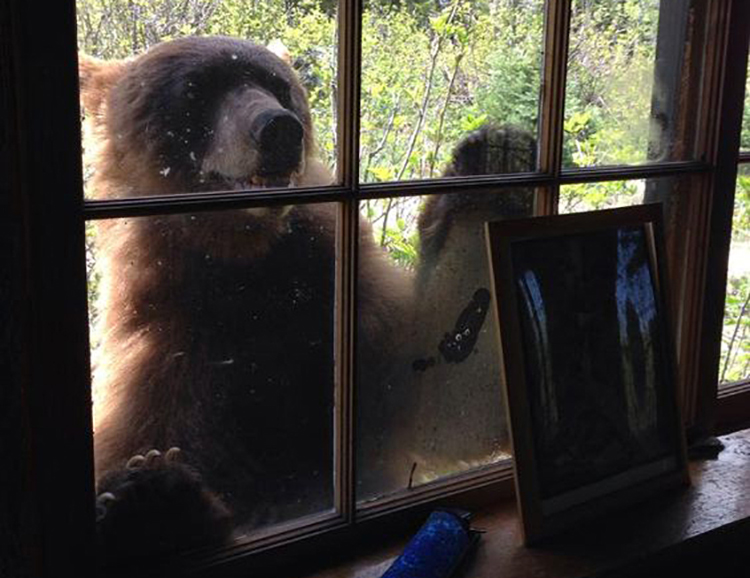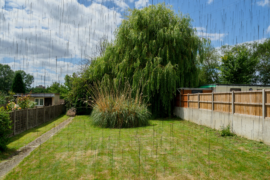T. S. McAdams

Farewell, world. I don’t mean that overdramatically. I know Death stalks you, too, hapless reader, in the guise of illness or accident or the biological equivalent of planned obsolescence, when your own cells, callous little bureaucrats, arbitrarily decide self-repair is no longer authorized. My own death—I won’t call it “premature” at fifty-eight; Death doesn’t make appointments—proves to be a brown bear pressing through the screen door of this rented cabin and rearing up to model crumpled mesh and aluminum headgear, like a novelty hat you might buy if your athletic team adopted screen doors as their mascot; but that doesn’t matter. Whether it’s garden-variety doom or something more exotic, maybe bad pufferfish or one of those chunks of frozen shit that plummet from 737s, Death takes each of us and then, inexorably, Death takes all who knew us, and it is as though we never were.
There’s no escape, surrounded as I am by a jumble of mismatched armchairs with matching headrest doilies, a vintage entertainment center with a laserdisc player and a massive CRT television, and a cunning barricade of glass-topped coffee tables. I couldn’t outrun a bear regardless. No one could. The coffee tables are littered with pinecones decorated to look like owls by someone who will not be remembered, unless my judgment is seriously flawed, for his or her achievements in the rural knickknack genre. The nearest table also holds a stack of legal pads and my laptop. I was to write my book this summer, a stab at immortality, my own pinecone owl, ha ha. The bear shakes the door from his head and licks his chops. Freud says the unconscious is incapable of believing it will die, which may be true, but the conscious mind catches on at moments like this, let me tell you.
Leaving eleven blank pads on the table and scribbling pointlessly on the twelfth, I back to the big fixed window, outside of which I observe an ascending slope strewn with fir and hemlock trees. The rental agent told me they were fir and hemlock and explained a few ways to tell them apart; for example, hemlock needles are flat and fir needles are flatter, but they’re all pines to me. Conifer illiteracy isn’t high on my list of regrets. Even so, I should have paid attention.
Hello. I’m a bear. You may blame my penmanship on paws better suited to digging and, yes, killing than to wielding this mechanical pencil, or you might consider that I am drowsy after eating Leonard Hurst (the name on his Yuba Community College faculty ID) and somewhat shaken by his letter. We sneer at cloistered theorists who explain our experience to us, and I’ve surely seen more death than he did, but it never hit me before reading Hurst that Ursus arctos horribilis has a twenty-five year lifespan, and mine is two-thirds gone. Ten years from now, my scent will have faded from every tree I marked. What’s the point? Granted, if Schopenhauer is right and death is the final judgment of nature, then I was at least the final judge of Leonard Hurst, but what does judging amount to if there’s only one possible verdict?
It doesn’t mean a thing that I’ll leave a written testimony, something no other bear has accomplished, with no model to guide me but three paragraphs by Leonard Hurst (talk about anxiety of influence). You may remember that a nameless bear wrote something, but you won’t be remembering me. The same would have applied to Hurst’s book. Suppose you knew his name as the author of Feather River Blues? (That working title was the full extent of his notes.) Would the name be him? Would you know him? Would you know how he squealed at the end or how gristly and gamy he was? Even if there were an “about the author” page with a biographical sketch, would that give Leonard Hurst more reality than a fictional character? Was there really a Homer? Does it make a difference?
Leonard Hurst doesn’t exist on a page or in the hearts of grateful students. Leonard Hurst is gurgling through my digestive tract (a simple coil of intestine without even the rudimentary cecum in a human gut, but longer than yours, absolutely and proportionately, and correspondingly efficient). Early tomorrow morning, if not some time tonight, I will extrude him, and that will be that, for Hurst and for all of us, give or take a few details. Therefore, send not to know if a bear shits in the woods; a bear shits thee. This is the useless and unsatisfactory lesson Hurst and I taught each other, and I rededicate myself to imposing it on elk calves, deer fawns, grouse chicks, marmots, voles, woodrats, gophers, ground squirrels, salamanders, and ant larvae. I don’t know, and it doesn’t matter, whether this is best characterized as affirmation or resentment. I’ll smash these ridiculous pinecone owls on my way out.
T. S. McAdams is one of those people your dog likes, so he’s probably okay. His fiction has appeared in Beneath Ceaseless Skies, Santa Monica Review, Pembroke, Exposition Review, Faultline, Lady Churchill’s Rosebud Wristlet, Pacifica Literary Review, and other fine periodicals near you. Follow him on Twitter at @dross_and_wunda.



